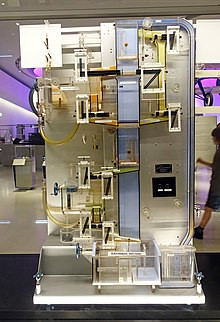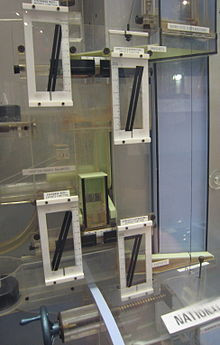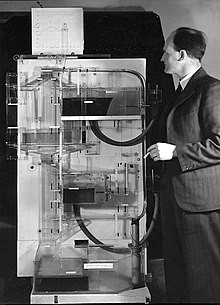
Date: 2026-01-17 Page is: DBtxt003.php L0300-QoL-001a
SOCIAL ISSUES
QUALITY OF LIFE
A Burgess Brief (from around 2005) about quality of life
and how it should be improved
QUALITY OF LIFE
A Burgess Brief (from around 2005) about quality of life
and how it should be improved



MONIAC in the Science Museum, London ... MONIAC dashboard ...Phillips with MONIAC (circa 1958-67)
This was around the time I was at Cambridge in the Economics Department!!!!!
Original article: https://en.wikipedia.org/wiki/MONIAC
Peter Burgess COMMENTARY
It is almost ten years since I wrote the following observations. At the time I was building a collection of 'Burgess Briefs' and I am seriously surprised at how relevant many of my observations from that time still are. The good news for me as that many of my ideas are slowly emerging into something that might be described as more mainstream, but the bad news is that that there is still a very powerful community of managers and management accountants who are firmly stuck in a way of doing things that ought to have been banned a very long time ago. The long shaddow of economists like Milton Friedman still cast a shadow and prevent a lot of younger and better people to become influential.
The reference to MONIAC and the Phillips Machine brings back memories. In 1960 I was in the Cembridge Economics Department and the Phillips Machine was located in the lower level of the Marshall Building. Before studying economics, I had done the Tripos work for and Engineering Degree in the Engineering Department where I had learned something of analog computing and the emerging digital world. This analog machine that linked my two areas of study was something of an awakening ... something that has never gone to sleep.
Peter Burgess
I made this observation in Facebook recently (that is recently in 2003):
With a very long history of productivity improvement, why is quality of life for working Americans declining? The answer is that investors and investor/executives have hijacked ALL of the money profit gain for themselves. Obama is moving us away from this. Romney will not.I have been disappointed that academics in the mainstream of public dialog about society and the economy are not really clear about the way a modern economy works. This is not new ... it is something that has been going on for several decades.
When I was a student at Cambridge around 1960, we had a wonderful 'model' that showed how a Keynesian economy worked. It was not a digital model, but analog. It was made of glass tubing with various valves and tanks so that the water (money) could be controlled as it went round and round in the tubes, tanks, etc (the economy). The glass tubes were color coded so that we would easily understand the flows that are going on in the economy.
By modern standards this was rather unsophisticated ... but it was clear and was a surprisingly good simulation of the complexity of the economy. Since then I have visualized the economy using this model and it has served me well.
It works very well for the understanding of a poor subsistence economy at the village level as well as for more complex situations with many elements and flows.
While at Cambridge, I also studied engineering and had friends who were doing research in many different disciplines within the University. I was present at one of the first lectures that introduced the idea of DNA to the public, attended one of the first demonstrations of laser light and participated in discussions about the emerging field of 'solid state physics'. I was impressed by how fast science and technology was progressing.
But the last fifty years have seen an acceleration of this progress of science and technology that is really quite amazing in its power and potential.
But something else has happened in the last fifty years. There has been a boom in education around the world and at the same time a dumbing down of what gets learned in the formal education systems of the world ... except at the highest levels where science and technology still progress.
In the 'social science' the dumbing down of the subjects can go on for a long time without a crisis emerging. In the case of an engineering system, the results are pretty obvious pretty quickly. The plane doesn't fly or the bridge falls down. In economics the problems don't really emerge so quickly ... like the famous story of the lobster getting boiled in the pot, never noticing the rising temperature of the water until it is too late.
So in 50 years we have had amazing improvement in the productivity of everything based on science and technology, and for advanced industrialized economies, virtually no improvement in the quality of life of ordinary working people.
The investor class and senior executives have made business decisions based on using increased productivity to produce more goods and services with less wage cost. With less need for labor, wages have diminished and at the same time profits have gone up.
With better communications and transportation, the wage problem became even worse. Huge undeveloped pools of labor around the world were mobilized to reduce wage costs further and increase profits more. As Eduard Cardin writes in his book Unintended Consequences ... 'there is an unlimited supply of labor prepared to work at 74 cents and hour'
Huge underutilized pools of labor and accountants (more and more with MBA training) showed decision makers just how much extra profit could be made when industrial machinery is operated by workers earning 74 cents an hour with no benefits rather than $30 an hour plus benefits, and in working conditions that are unlawful in older industrialized societies.
The money profit laissez-faire capitalist market economy worked quite well for many years after it was described in a book published by Adam Smith in 1776, but a lot has changed since then. The most critical change is productivity which in the 18th century meant that the people of the world could not produce enough food to eat nor enough of other essentials and now in 2012 can produce more than is needed with a big part of the world's people not working. In other words what used to be a global shortage economy is now a global surplus economy.
Actually, this is not quite right. The money profit economy on allocates resources into economic activities that are expected to produce profit. Even with modern amazing productivity, at least 1 billion people in the world are not able to engage in economic activity that will give them enough money to buy things they need at price levels that will earn investors profit. The needs of these people are never going to be satisfied with the money profit metrics used for investment decision making.
Many different people and organizations have identified this problem, and steps have been taken to change the way society and business operates. So far, however, the scale of these initiatives has been quite modest compared to the need, and I will argue, that the money profit market system is in great danger of imploding because the aggregate demand so important to its functioning has been eroded catastrophically.
Simply put, the challenge is for everyone on the planet to be able to engage in economic activity that is does something that contributes to the process of satisfying need. The resources we have can be organized to do this, but not when the only metric in play is money profit growth. I argue for something like TrueValueMetrics which has social valuadd equally or more important than money profit, and I argue for capital markets that engage with social value as much as they engage with money value. https://en.wikipedia.org/wiki/MONIAC MONIAC in the Science Museum, London. MONIAC dashboard Phillips with MONIAC (circa 1958-67) ... This was around the time I was at Cambridge in the Economics Department!!!!! A working MONIAC (or Phillips Machine as it is known in the UK) can be found at the Faculty of Economics at Cambridge University in the United Kingdom. This machine was restored by Allan McRobie of the Cambridge University Engineering Department, who holds an annual demonstration to students.